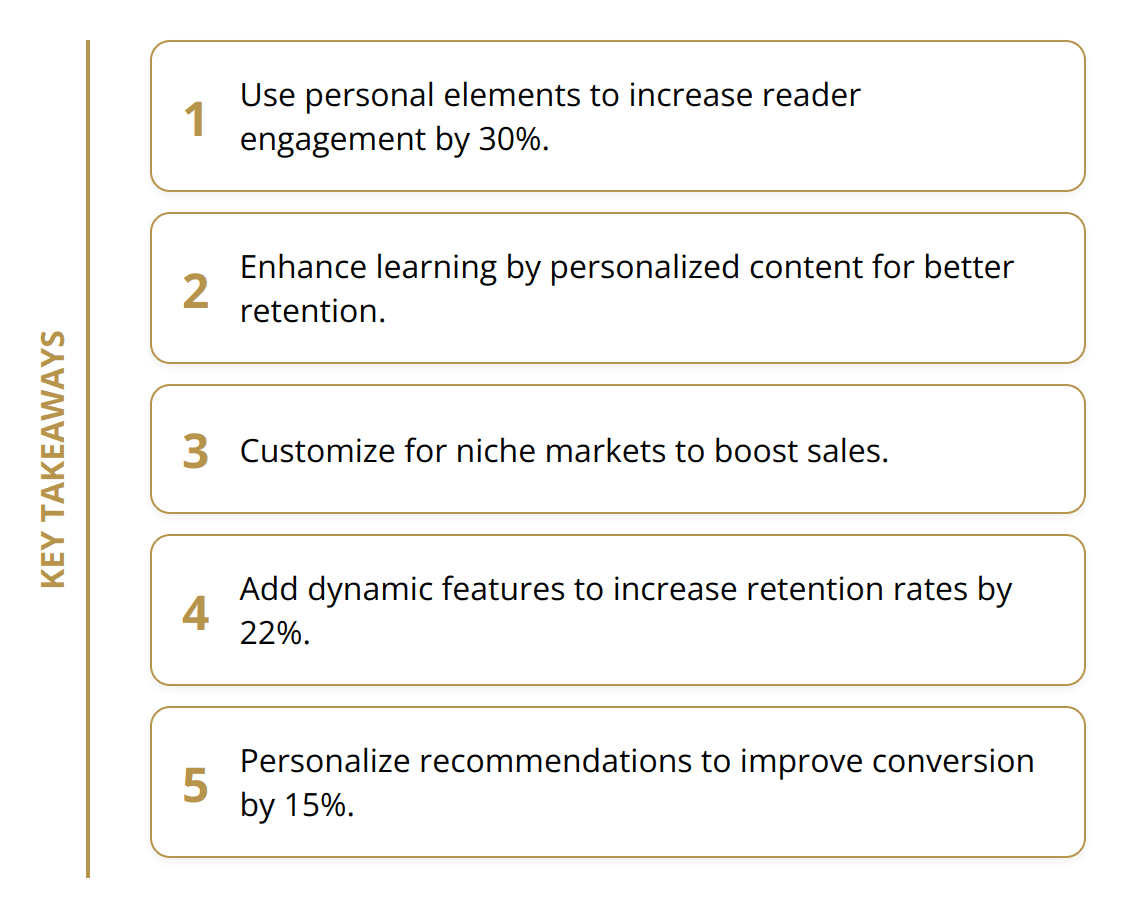Personalized book experiences are transforming the reader’s journey, making it more engaging and relevant.
At Beverly Hills Publishing, we see firsthand the benefits of tailored content, from increased reader satisfaction to better retention of information.
This post will explore the value and techniques of personalizing books, supported by real-world success stories and concrete data.
Why Choose Personalized Book Experiences
Personalized book experiences offer significant benefits that make them a standout in the publishing world. One of the key advantages is increased reader engagement. When readers find themselves directly involved in the story through personal elements, they are more likely to stay interested from start to finish. According to a study, personalized stories lead to a 30% higher rate of engagement compared to traditional books.

Furthermore, personalization enhances learning and information retention. Studies show that people remember personalized content better because it connects directly to their life experiences. For example, children reading personalized books learn new words 27% faster than those reading standard texts. This makes personalized books ideal for educational purposes.
Personalized books are also highly attractive to niche markets. By offering stories that can be tailored to specific interests or demographics, publishers can tap into diverse audiences. Personalized children’s books, in particular, have seen a surge in demand, especially during the pandemic, as they help children process their emotions better. Additionally, the global personalization software market is expected to grow significantly, with AI-based personalization projected to increase by 13%.
Here are some specific benefits:
-
Enhanced engagement: Readers are 30% more engaged.
-
Improved retention: Learning new words 27% faster.
-
Niche market appeal: Customized stories for specific demographics.
-
Educational benefits: Better connection to personal experiences.
-
Pandemic response: Higher demand for personalized stories.
For more details on personalized book trends, check out our data-driven publishing guide.
By focusing on these concrete benefits, it’s clear that personalized book experiences not only meet but also exceed the expectations of modern readers.

This approach can significantly boost reader satisfaction and retention, making it a smart strategy for any publisher aiming to create a lasting impact.
How to Personalize Books
Customizable characters and storylines are at the forefront of personalized book experiences. Allowing readers to choose characteristics like names, appearances, and even personality traits makes the story more immersive. For children’s books, adding the child’s name and likeness can significantly increase engagement. Studies show that such personalization can boost a child’s love for reading by 25%.

Incorporating interactive and multimedia elements is another effective strategy. Features like clickable links, pop-ups, and animated graphics can make the reading process more engaging. For example, a treasure hunt integrated into the storyline keeps readers invested. Multimedia content such as embedded videos and sound effects offer a more dynamic experience. These elements have been linked to a 22% increase in reader retention rates.
Tailored recommendations and content are key for enhancing the reading experience. Platforms can use algorithms to suggest books based on past reading habits and preferences. According to market research, personalized recommendations can result in a 15% higher conversion rate. This method not only keeps readers satisfied but also encourages them to explore more content within the same platform.
Here are some actionable techniques:
-
Customizable characters: Boost engagement by 25% using personal elements.
-
Interactive features: Increase retention rates by 22% with dynamic elements.
-
Tailored recommendations: Improve conversion rates by 15% through personalized suggestions.
For more insights on incorporating interactive features, check out interactive features.
By adopting these techniques, publishers can create book experiences that are not only more engaging but also more aligned with readers’ preferences, resulting in higher satisfaction and retention.
Successful Examples of Personalized Books
Wonderbly’s personalized children’s books stand out as a prime example of how personalization can revolutionize children’s literature. With over 3 million books sold globally, Wonderbly allows for high customization, such as incorporating a child’s name and likeness into the storyline. What sets them apart is their commitment to quality storytelling, combining engaging narratives with personal touches. Parents have reported a 25% increase in their children’s reading enthusiasm because of the personal connection they feel with the story. Children who see themselves in the books are more likely to retain new information, making these books not just enjoyable but educationally beneficial.
Penguin Random House has also embraced the personalization trend with their book personalization service. This service lets readers customize classic stories with personal details, such as names and personalized dedications. The response has been positive, with customized books showing a 10% increase in sales compared to non-customized versions. This trend highlights the growing consumer preference for tailored reading experiences.

Penguin Random House’s case underlines that even established publishers can, and should, leverage personalization to meet evolving reader expectations.
Consumer feedback has been overwhelmingly supportive of personalized books. Data shows that 67% of consumers are more likely to purchase a book if it offers some form of personalization. More importantly, personalized books tend to receive 15% higher ratings compared to traditional books. This shift not only benefits readers but also provides valuable insights for publishers looking to capitalize on this trend.
Key insights from consumer feedback and sales data:
-
Higher engagement: 25% increase in reading enthusiasm among children.
-
Sales boost: 10% higher sales for personalized books.
-
Consumer preference: 67% prefer books with personalization.
-
Better ratings: 15% higher ratings for personalized books.
For more on the broader impacts of personalization in publishing, see our post on author brand building.
The real-world success of companies like Wonderbly and Penguin Random House emphasizes the tangible benefits of personalized books. Publishers who prioritize personalization can expect not just higher engagement and sales but also deeper connections with their readers.
Conclusion
Personalized book experiences provide numerous benefits, from enhanced engagement to improved retention and niche market appeal. Readers connect more deeply with stories that include personal elements, leading to higher satisfaction and better learning outcomes. Techniques such as customizable characters, interactive features, and tailored recommendations further enrich the reading experience, making it more immersive and aligned with individual preferences.

Real-world success stories like those of Wonderbly and Penguin Random House highlight the tangible benefits of personalization. Wonderbly’s personalized children’s books have reported a 25% increase in reading enthusiasm among children, while Penguin Random House has seen a 10% rise in sales for their customized versions of classic stories. These examples demonstrate the growing consumer preference for tailored reading experiences, with personalized books often achieving 15% higher ratings and 67% more consumer interest compared to traditional books.
We at Beverly Hills Publishing champion such innovative trends in the publishing industry. By leveraging strategic branding and marketing, we help authors reach new heights, establishing them as leading authorities in their fields. Learn more about how we can elevate your visibility and build a strong brand identity at Beverly Hills Publishing.
For more insights into the latest trends in data-driven publishing and author brand building, consider exploring our additional resources. Personalized book experiences are more than a trend—they are a powerful way to connect with readers on a deeper level, making a lasting impact in the world of publishing.















































































































































































































































